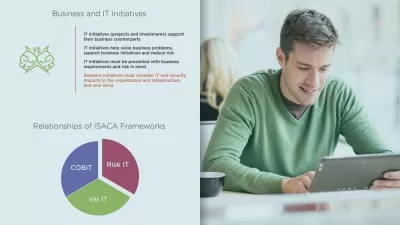Fundamentals of Strategic Financial Risk Management
YouAccel Training
2:30:27
Description
Essential Theories and Strategies for Effective Financial Risk Identification, Measurement, and Mitigation
What You'll Learn?
- Understand the fundamentals of financial risk and its importance in global markets.
- Explore key financial risk management theories and their applications.
- Learn the different categories of financial risk and how to identify them.
- Gain insight into techniques for effective risk identification.
- Understand the basics of quantitative and qualitative risk measurement methods.
- Analyze the importance of integrating both quantitative and qualitative data in risk management.
- Develop a strategic approach to mitigating financial risks.
- Learn how to build comprehensive risk mitigation strategies.
- Understand the ethical considerations involved in financial risk management.
- Explore how ethical principles can guide decision-making in risk management.
- Study the role of strategic risk management in ensuring organizational stability.
- Understand how to assess risk in different market environments.
- Gain insight into the relationship between risk management and financial resilience.
- Learn how to integrate ethical principles with risk mitigation strategies.
- Explore the theoretical foundations that underpin risk management practices.
- Analyze how organizations can anticipate and address future financial risks.
Who is this for?
What You Need to Know?
More details
DescriptionThis course is designed to provide students with a thorough understanding of the theories and principles underpinning financial risk management. It offers an in-depth exploration of key concepts related to the identification, measurement, and mitigation of financial risk, focusing primarily on the theoretical frameworks that guide these processes. While this course is theoretical in nature, it will offer a broad perspective on how these foundational ideas are applied in practice, giving students a solid grounding in financial risk management strategies that can be adapted to a variety of real-world situations.
The course begins by introducing the concept of financial risk and emphasizing its critical role in today’s complex and interconnected global markets. Financial risk management is essential for organizations seeking to safeguard their assets, ensure stability, and promote sustainable growth. Through the exploration of fundamental risk concepts, students will gain an appreciation for the importance of identifying, understanding, and managing financial risks effectively. The introductory sections delve into the basics of financial risk, guiding students through the core principles that form the backbone of risk management theory. By understanding these foundational ideas, students will be able to contextualize the more advanced strategies and methodologies discussed later in the course.
One of the key elements of financial risk management is risk identification. The course explores various risk concepts and categories, helping students recognize the different types of risks that organizations face. Identifying risks early is crucial to mitigating their impact, and students will be introduced to various techniques for assessing both quantitative and qualitative risks. By examining the interplay between these different methods, students will develop a more nuanced understanding of how risks are measured, evaluated, and prioritized. This section also emphasizes the importance of a comprehensive approach to risk measurement, combining both quantitative data and qualitative insights to create a more complete risk profile.
In addition to risk identification and measurement, the course covers strategic approaches to risk mitigation. Mitigating financial risks requires a deep understanding of the factors that contribute to these risks and how they can be managed or minimized. Students will explore the fundamentals of risk mitigation, learning how to develop strategies that not only address existing risks but also anticipate future challenges. By understanding the broader strategic implications of risk management, students will be better equipped to implement solutions that are both effective and sustainable in the long term.
Ethics play a pivotal role in financial risk management, particularly as companies navigate complex regulatory environments and societal expectations. This course examines the integration of ethical principles into risk management strategies, highlighting the importance of maintaining a balance between financial objectives and ethical considerations. Students will explore how ethical principles influence decision-making processes, guiding organizations in developing risk mitigation strategies that are aligned with broader societal goals.
Throughout the course, students will have the opportunity to critically engage with a variety of risk management theories and frameworks. By the end of the course, students will possess a comprehensive understanding of the theoretical foundations of financial risk management, empowering them to analyze and address risks with confidence and ethical foresight. The theoretical knowledge gained will serve as a crucial foundation for those looking to further their expertise in the field of financial risk management, providing a solid base for future studies or practical applications.
Who this course is for:
- Finance professionals seeking to strengthen their understanding of financial risk management theories and strategies.
- Aspiring risk managers looking to build a strong foundation in risk identification, measurement, and mitigation.
- Business leaders and decision-makers interested in enhancing their organization's financial stability through effective risk management.
- Students or graduates in finance, economics, or business administration looking to broaden their knowledge of financial risk management.
- Individuals pursuing careers in banking, insurance, or financial services who want to deepen their understanding of risk management practices.
- Compliance officers and auditors who need a better grasp of financial risks and how they are managed within organizations.
- Anyone interested in gaining insight into the theoretical principles of financial risk management and how they apply to real-world scenarios.
This course is designed to provide students with a thorough understanding of the theories and principles underpinning financial risk management. It offers an in-depth exploration of key concepts related to the identification, measurement, and mitigation of financial risk, focusing primarily on the theoretical frameworks that guide these processes. While this course is theoretical in nature, it will offer a broad perspective on how these foundational ideas are applied in practice, giving students a solid grounding in financial risk management strategies that can be adapted to a variety of real-world situations.
The course begins by introducing the concept of financial risk and emphasizing its critical role in today’s complex and interconnected global markets. Financial risk management is essential for organizations seeking to safeguard their assets, ensure stability, and promote sustainable growth. Through the exploration of fundamental risk concepts, students will gain an appreciation for the importance of identifying, understanding, and managing financial risks effectively. The introductory sections delve into the basics of financial risk, guiding students through the core principles that form the backbone of risk management theory. By understanding these foundational ideas, students will be able to contextualize the more advanced strategies and methodologies discussed later in the course.
One of the key elements of financial risk management is risk identification. The course explores various risk concepts and categories, helping students recognize the different types of risks that organizations face. Identifying risks early is crucial to mitigating their impact, and students will be introduced to various techniques for assessing both quantitative and qualitative risks. By examining the interplay between these different methods, students will develop a more nuanced understanding of how risks are measured, evaluated, and prioritized. This section also emphasizes the importance of a comprehensive approach to risk measurement, combining both quantitative data and qualitative insights to create a more complete risk profile.
In addition to risk identification and measurement, the course covers strategic approaches to risk mitigation. Mitigating financial risks requires a deep understanding of the factors that contribute to these risks and how they can be managed or minimized. Students will explore the fundamentals of risk mitigation, learning how to develop strategies that not only address existing risks but also anticipate future challenges. By understanding the broader strategic implications of risk management, students will be better equipped to implement solutions that are both effective and sustainable in the long term.
Ethics play a pivotal role in financial risk management, particularly as companies navigate complex regulatory environments and societal expectations. This course examines the integration of ethical principles into risk management strategies, highlighting the importance of maintaining a balance between financial objectives and ethical considerations. Students will explore how ethical principles influence decision-making processes, guiding organizations in developing risk mitigation strategies that are aligned with broader societal goals.
Throughout the course, students will have the opportunity to critically engage with a variety of risk management theories and frameworks. By the end of the course, students will possess a comprehensive understanding of the theoretical foundations of financial risk management, empowering them to analyze and address risks with confidence and ethical foresight. The theoretical knowledge gained will serve as a crucial foundation for those looking to further their expertise in the field of financial risk management, providing a solid base for future studies or practical applications.
Who this course is for:
- Finance professionals seeking to strengthen their understanding of financial risk management theories and strategies.
- Aspiring risk managers looking to build a strong foundation in risk identification, measurement, and mitigation.
- Business leaders and decision-makers interested in enhancing their organization's financial stability through effective risk management.
- Students or graduates in finance, economics, or business administration looking to broaden their knowledge of financial risk management.
- Individuals pursuing careers in banking, insurance, or financial services who want to deepen their understanding of risk management practices.
- Compliance officers and auditors who need a better grasp of financial risks and how they are managed within organizations.
- Anyone interested in gaining insight into the theoretical principles of financial risk management and how they apply to real-world scenarios.
User Reviews
Rating
YouAccel Training
Instructor's Courses
Udemy
View courses Udemy- language english
- Training sessions 24
- duration 2:30:27
- Release Date 2025/02/24











